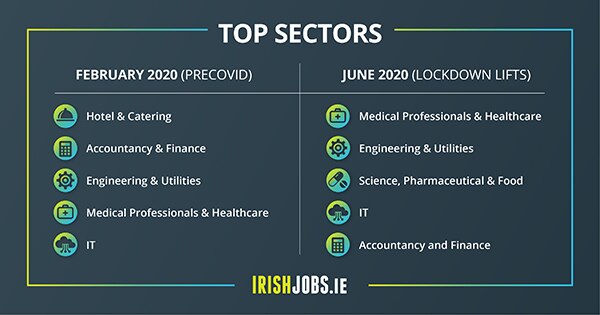Ireland’s employment market experienced an increase in job vacancies for the period of May to June according to the latest Jobs Index from e-recruitment platform IrishJobs.ie.
The index, which analyses quarterly job vacancy data, reveals that job postings increased by 14% from May to June, with 30 June marking the busiest day for job postings. This spike in activity came as Ireland entered Phase Three of the Government’s roadmap for reopening society and business (29 June).
Industry breakdown

Over the course of the COVID-19 pandemic, the majority of sectors experienced a decline in job vacancies, with an average decrease of 51% in job postings for the wider period of March to June. Within this, Monday, 4 May proved to be the low point for jobs vacancies.
Tourism, travel and airlines (-100%), hotel and catering (-95%), beauty, hair care, leisure and sport (-87%), HR and recruitment (-77%) and sales (-74%) were among the industries most affected while others including telecoms (-1%), pharmaceutical and food (-7%), and banking and finance services and insurance (-34%) remained more resilient.
However, of the 31 individual sectors analysed in the latest index, 26 experienced an increase in vacancies in the month of June.
The beauty, haircare, leisure & sport (+206%) sector recorded the largest increase in job vacancies for June followed by marketing (+125%) and hotel and catering (+91%).
During this period, medical professionals and healthcare (+16%), engineering and utilities (+11%), and science, pharmaceutical and food (+10%) were the most active industries, generating the largest portion of job vacancies overall.
Despite an increase in job posting during the period of May to June, overall vacancies still remain 54% below February’s pre-COVID index levels with sectors including tourism, travel and airlines (-100%) continuing to experience the negative impact of COVID-19 restrictions.
Insight

Commenting on the publication of the IrishJobs.ie Jobs Index, Orla Moran, General Manager of IrishJobs.ie said:
“The latest IrishJobs.ie Jobs Index is a timely indicator of post lockdown recruitment trends in Ireland. Since the beginning of the COVID-19 pandemic, job vacancies have declined significantly with the majority of industries experiencing a recruitment freeze, as they navigated through extremely uncertain times.
“One sector that remained active was the medical and healthcare professionals’ group which generated the largest portion of job vacancies during this time. This can in part be attributed to the success of IrishJobs.ie’s support of the HSE’s Covid-19 emergency recruitment drive.
“However, the findings from the latest index signals that the overall employment market is starting to reopen and rebound, with a 14% increase in job postings over the period of May to June.
“When we look at this data in detail, the biggest spike in new vacancies occurred on 30 June – the day after we entered Phase Three of the Government’s roadmap for reopening society and business. The correlation between this spike in activity and the reopening of many businesses across the country reaffirms that we are moving in the right direction, but we must acknowledge that there is still a way to go before we return to pre-COVID recruitment levels.
“As the figures reveal, Irish job vacancy rates remain at 54% below pre-COVID levels. This figure is further compounded by recent IDA Ireland comments suggesting that foreign direct investment will likely slow down over the next two years.
“Therefore, in order to get back to pre-COVID levels of recruitment and wider market buoyancy, we must be swift and proactive in addressing the needs of individual sectors.
“The Government’s soon to be announced jobs stimulus package will have a central role to play, both in saving existing jobs and creating new ones. Tánaiste Leo Varadkar has suggested that the package will be “radical” and “far reaching”. We’ve no doubt that this support will be welcomed by many industries and business communities who are currently experiencing challenging times.
“The extension of the temporary wage subsidy scheme to the end of the year would certainly be welcomed by employers and affords them greater clarity and breathing space as they plan for the rest of the year and make provisions for a potential second wave.
“Government must continue to work with industry groups to identify the challenges that each sector and region faces while fast-tracking the necessary supports to help businesses to recoup from the pitfalls of the past few months.”
